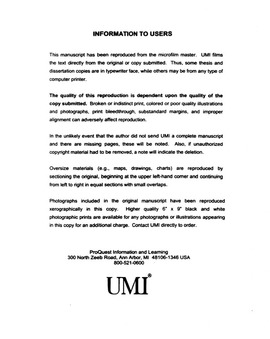| dc.contributor.advisor | Fry, Pamela G., | en_US |
| dc.contributor.advisor | Maiden, Jeffrey, | en_US |
| dc.contributor.author | Foote, Merrie Susan. | en_US |
| dc.date.accessioned | 2013-08-16T12:18:25Z | |
| dc.date.available | 2013-08-16T12:18:25Z | |
| dc.date.issued | 2001 | en_US |
| dc.identifier.uri | https://hdl.handle.net/11244/391 | |
| dc.description.abstract | While each of the three participants in this study was unique and expressed her own perspective of the experience in implementing the externally mandated change inherent in the Oklahoma Reading Sufficiency Act (1998), there were striking similarities as well as differences among the three principals. After examining their philosophies of leadership, their need to foster collegiality and collaboration, their willingness to support staff development to promote construction of knowledge, and the necessity of dealing with externally mandated change, it was found that all three principals' leadership tactics were, in essence, successful in implementing the Oklahoma Reading Sufficiency Act (1998). | en_US |
| dc.description.abstract | This study sought to understand the experiences of three elementary school principals who worked with teachers to implement the state-mandated Oklahoma Reading Sufficiency Act (1998). A phenomenological research design allowed the researcher to study three elementary school principals whose leadership with teachers assisted in implementing state-mandated school reform. This is the phenomenon that the researcher sought to better understand. | en_US |
| dc.description.abstract | The form of participant selection known as non-probability, purposive sampling was used. Initially, each participant was selected based on methods of reputational and network sampling. The elementary principals were described by others in the field as "good at what they do, " indicating that there was a level of recognition of effectiveness in the person. Criteria for selection included being the principal of an elementary school that included kindergarten through grade three. Participants must have been principals during the implementation of the Oklahoma Reading Sufficiency Act (1998). | en_US |
| dc.description.abstract | The purpose of this study was to examine the work and experiences of three elementary school principals (grades K--3) who have implemented the provisions of the Oklahoma Reading Sufficiency Act (1998). By examining the work of principals in implementing externally mandated change, the study helped clarify the leadership of the principal, who, according to the language of the Oklahoma Reading Sufficiency Act (1998), is responsible for the development, implementation, and evaluation of the site plan. | en_US |
| dc.format.extent | ix, 156 leaves ; | en_US |
| dc.subject | Educational change Oklahoma. | en_US |
| dc.subject | Elementary school principals Oklahoma. | en_US |
| dc.subject | Education, Administration. | en_US |
| dc.subject | Oklahoma. Reading Sufficiency Act. | en_US |
| dc.title | Principal leadership in the implementation of externally mandated change. | en_US |
| dc.type | Thesis | en_US |
| dc.thesis.degree | Ph.D. | en_US |
| dc.thesis.degreeDiscipline | Department of Educational Leadership and Policy Studies | en_US |
| dc.note | Major Professors: Pamela G. Fry; Jeffrey Maiden. | en_US |
| dc.note | Source: Dissertation Abstracts International, Volume: 62-10, Section: A, page: 3251. | en_US |
| ou.identifier | (UMI)AAI3029618 | en_US |
| ou.group | Jeannine Rainbolt College of Education::Department of Educational Leadership and Policy Studies | |
